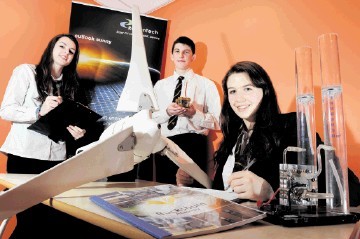
Bucksburn Academy’s Re-Thinking Energy team is only in year one of a two-year international project looking at Energy and they have already been delving into the benefits of hydrogen. Here team members S3 pupils Martin Close, Shona Doyle and Heather McAdam tell us in their words about their progress.
Bucksburn Academy is completing a two-year Comenius Re-thinking Energy Project in partnership with schools and colleges in Germany, the Netherlands, Norway and Sweden.
The group is investigating the shift from carbon to renewable energies in their countries, in a project sponsored by The North Sea Commission.
This has included monthly seminars on Re-thinking Energy.
These seminars are enabling the young people to find out about Scotland’s renewable energy sources and the technology behind it.
Key speakers from businesses and the local authority have supported the pupils, which has enhanced their work.
The most recent seminar, on January 16, covered hydrogen. It was opened by sixth-year pupil Alex Christides, who explained that hydrogen was a simple element and admits no greenhouse gasses and therefore does not contribute to global warming. Sixth-year pupils Ryan Cadenhead and Charlie Innes then went on to explain the chemical side of hydrogen.
Ryan talked about how a hydrogen cell works and explained that hydrogen is a sustainable fuel.
Charlie then presented the audience with a detailed diagram, which reinforced the science behind how a hydrogen cell works.
Iain Todd, renewables champion for Aberdeen Renewable Energy Group (AREG), also spoke at the seminar and explained how hydrogen could become a major industry in Aberdeen.
He stated that AREG’s aim was “to make Aberdeen as well known for renewables as it is for oil and gas”.
Todd also emphasised that using green hydrogen in the city could help to power heating and electricity in houses as well as power vehicles such as buses and cars.
Part of AREG’s ambition has already become a reality, as 10 hydrogen fuel cell buses are being made and will be seen around the city in Easter 2014. After the talk there were many enthusiastic comments and questions by the pupils.
As part of the Comenius Project, the Re-Thinking Energy team will be making study visits to partner schools.
The team will visit Norway early this month and a sustainable school in Sweden in May.
During the next school session, the team will travel to Germany and the Netherlands to further develop their knowledge of renewable energy.
The project will end in June 2014 when all partners visit Aberdeen. Bucksburn Academy, the lead partner in the project, will share their renewable energy investigations and case studies.
The school will also host an event for partners to celebrate the achievements of all the young people in the project.
The project is Curriculum for Excellence at its best with pupils developing their skills in science, technology, enterprise and maths in a theoretical and practical way.
Recommended for you
